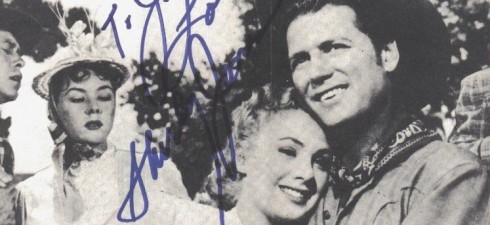Unfortunately, the scheduled review of Ondine has been postponed until a later date – hopefully soon. So that means (cue canned applause) you’re back with Andy today for the first part of a two-post analysis of the dream of the American West, through a particularly successful 1955 movie adaptation of the Broadway hit.
 Six years ago, my paternal grandfather, Dennis, died of Motor Neurone (Lou Gehrig’s) disease. From a man in excellent health, and not yet eighty years old, he quickly degenerated to need a scooter to gset around, and then rapidly again, to a bed in a hospice. He didn’t want to live for long there, and he died as winter came in at the end of 2005. When I heard he had gone, I walked to Helen’s house, and we went up to the hills overlooking the city where we lived, to let out the grief.
Six years ago, my paternal grandfather, Dennis, died of Motor Neurone (Lou Gehrig’s) disease. From a man in excellent health, and not yet eighty years old, he quickly degenerated to need a scooter to gset around, and then rapidly again, to a bed in a hospice. He didn’t want to live for long there, and he died as winter came in at the end of 2005. When I heard he had gone, I walked to Helen’s house, and we went up to the hills overlooking the city where we lived, to let out the grief.
Recently my sister showed me a photograph of the entry the family put in the Book of Remembrance for him, reminding me of the inscription. It struck me this time, more powerfully than before:
There will always be a bright, golden haze on the meadow. Our eternal love.
The first line is a reference to the opening line of the musical Oklahoma!, sung in the 1955 movie version by Gordon Macrae. The movie was one of my granddad’s favourites, and seeing the photograph again made me reflect on what it was about this particular production from Hollywood’s ‘golden age’ that appealed to him. I’d never seen the film before, so this last Monday I invited my family over to watch it at our house. My Dad was singing along to the songs he’d heard a thousand times on the old LP they had playing through his childhood. My two girls sang along to the choruses in their cute way that doesn’t depend on knowing the lyrics to songs. Helen and I held hands and smiled at each other through the love songs. It’s great family entertainment.
But there’s something else going on beneath the surface of this film. When the female lead Laurey (played by Shirley Jones) falls asleep on her front porch, she enters a surrealistic dream world, where doubles of both herself and her love interest Curly dance a beautiful representation of their love, before a hellish imagination of a sham marriage to Jud (Rod Steiger) puts her at the top of a staircase that leads to nowhere. This dream world is more than an opportunity to include a stunning dance sequence, I think: it’s an introduction of a subjective psychology onto two contrasting landscapes. The dance with Curly is in a world of yellow corn and massive blue skies, while the nightmare marriage to Jud is represented on a version of the bars and gambling halls of the cities: firey chandeliers and spilled card games are a way of showing the world attacking and taunting her.
 The film’s title song, ‘Oklahoma, OK!’ includes the repeated line: ‘we know we belong to the land/ and the land we belong to is grand’, as part of a narrative that connects Curly and Laurey’s new life together to the impending acceptance of Oklahoma as a state of the union. The territory is growing up, and becoming part of wider society, as they are. I think it may have been this dream of the West: the ‘bright golden haze’ on the landscape that appealed to my granddad, as well as all the wit and charm of this film more widely. On September 11th, 1969, his family (my Dad was nine years old at the time) set off from England on a ship, to begin a new life in Perth, Australia. They spent a few happy years there, and upon returning to Britain, soon met two LDS missionaries and joined the church of the American West. These things speak to me of something I feel within myself — the human instinct for remaking: for the possibility of new lands, and the self-definition that accompanies this.
The film’s title song, ‘Oklahoma, OK!’ includes the repeated line: ‘we know we belong to the land/ and the land we belong to is grand’, as part of a narrative that connects Curly and Laurey’s new life together to the impending acceptance of Oklahoma as a state of the union. The territory is growing up, and becoming part of wider society, as they are. I think it may have been this dream of the West: the ‘bright golden haze’ on the landscape that appealed to my granddad, as well as all the wit and charm of this film more widely. On September 11th, 1969, his family (my Dad was nine years old at the time) set off from England on a ship, to begin a new life in Perth, Australia. They spent a few happy years there, and upon returning to Britain, soon met two LDS missionaries and joined the church of the American West. These things speak to me of something I feel within myself — the human instinct for remaking: for the possibility of new lands, and the self-definition that accompanies this.
The psychology that writes itself on this new land is personal, and I wish my granddad was still around for me to ask him about his experience as he, a former merchant navy sailor, went from horizon to horizon. He was, until the severe end of his cruel illness, an incredibly vital and creative man. Despite my doubts regarding the afterlife, I know I’ll meet him many times in my future. He chose to be cremated, and his ashes were scattered beneath a tree in a beautiful field. He belongs to the land: the same land that is mine.
;

I really enjoyed watching the film.. and Cara (4yrs) and Felicity (2yrs) loved it too – the music and dancing are just so much fun. We should watch more old movies. The dream sequence was a little scary, but not really in a conventional way, and I wondered whether Cara and Felicity would really pick up on it.. but Cara got really quite frightened by it. Music and dancing are powerful tools to tell a story.
One of my earliest memories is associated with Oklahoma! My normally gentle, fair-haired dad dyed his hair black to play Jud Fry, when we went to the show, I was absolutely terrified of him. For all its gorgeous sunny optimism, Oklahoma has a dark undercurrent that seems all bound up with sexuality. I haven’t watched it in years, but this is making me want to rewatch and give it a feminist reading.
Here’s one of my favorite lines of the musical (from The Farmer and the Cowman):
I’d like to teach you all a little sayin’
And learn the words by heart the way you should
I don’t say I’m no better than anybody else,
But I’ll be damned if I ain’t jist as good!
Heidi, if you’ve only seen the movie version, see the full play. There’s a version with Hugh Jackman, made in 1999, on netflix.
I’ve seen it on stage many, many times and seen the 1955 adaptation, but I’ve not seen the production with Hugh Jackman. I’ll have to check it out.
I like Hugh Jackman, and I was impressed with his singing voice… but there’s something about the film version that I’ve got to say I prefer. I think Gordon Macrae is just easier in the role: but certainly the pressure of an audience and being filmed (one take?) must make it harder for the stage cast.
The reason I asked was because the full version is a more PG than the much more G movie.
To clarify, the full version gets to more of that sexuality issue you were mentioning, so I thought if you hadn’t seen it, there would be way more to analyze. :)